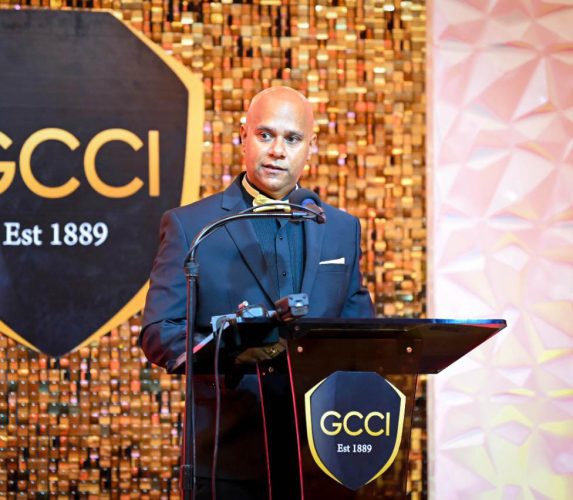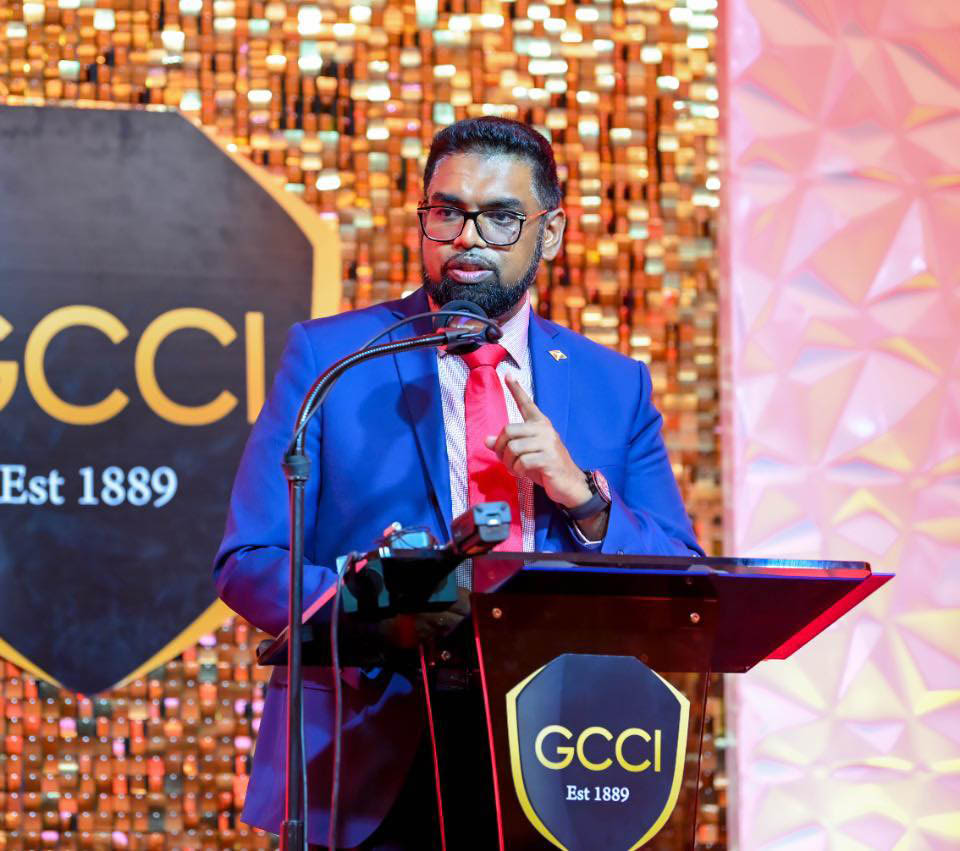President Irfaan Ali on Thursday challenged the country’s Diaspora to tap into local opportunities and urged investment in the housing sector, where he says demand will exist for years.
“We are working now, moving forward with the construction of Silica City – a new, smart, innovative city. The interest internationally in Silica is bubbling hot. Very soon we will move into the blueprint… we have a lot of liquidity that exists in the Diaspora. This is a challenge to the Diaspora. I challenge you today. You can’t do it individually. Come together. Mobilise $10 million or $20 million. Come to the local private sector. Mobilise what they can mobilise. And guess what? Build condos in high end areas. The market is there,” Ali on Thursday night said.

Addressing the annual awards ceremony of the Georgetown Chamber of Commerce and Industry (GCCI) on Thursday night, Ali said that he was sure that many in the Diaspora want to return home and there are revenue generators for them.
“Why we don’t you do this collectively. Twenty of you come together [who are] in this room? Come together and put up a business plan in which we can raise the capital from [the] Diaspora because they want to be involved in this. Or better yet, if we have to get 5,000 new apartments, let us not complain of how we get it. Develop a business plan and then let us presell the business plan. Get the Diaspora to invest in those apartments and they have an income,” Ali pitched.
“This is what Silica City would be doing: seeking out private investment from around the world. That is how all modern, smart, innovative cities are built. So we have to proactive, innovative…,” he stressed.
Ali said he hoped that citizens give him two terms in office as his government has plans for well into the 2030s.
The smart city plans are just one of many for technological development. He said this country wants to be the first place foreign companies come to establish their headquarters and source human resources in this region. “We are positioning ourselves to be a global destination for headquarters. This is very, very important. To do this, it is important that we examine a few key pieces of infrastructure. Some have already started, and some will come,” he said.
GCCI President Timothy Tucker told attendees that there is no denying that Guyana’s booming oil and gas sector generates billions in revenue. And with the country’s economy expanding at the fastest rate in the world, he said that the organisation commends the government for its responsiveness in the undertaking of several mega projects to keep up with this growth. “In the words of Dr. Singh “The making of modern Guyana is well underway, and today’s generation of Guyanese are incredibly privileged, not only to witness it but to be part of it,” he said, quoting Minister of Finance Dr.Ashni Singh.
“Our nation is now the hotspot for investments and the Chamber has witnessed this firsthand as we continue to welcome incoming delegations and potential investors. Although we are committed to pursuing all business opportunities that exist within the oil and gas sector, we must also remember that the agriculture and agro-processing, manufacturing, tourism, finance, and construction sectors are equally critical to the development of our nation,” Tucker said.
“Our business community plays a crucial role in Guyana’s development and local companies are now forced to think outside the box when it comes to brand recognition and marketing – especially if we are pushing local content. It is important that foreign investment in Guyana not be at the expense of indigenous Guyanese companies but it is equally important that local companies ensure that we can provide the quality of service required, whether through better access to finance, development forums, seminars, marketing fundamentals, the work never stops,” he added.
And because the local private sector is increasingly seen to have a role to play in helping the nation to meet local and international development targets, Tucker said that to ensure that the economy meets the highest international standards, the government and the private sector must join forces.
“In our capacity, GCCI has continually sought ways to add value to our nation and the business community we serve. GCCI’s Executive Management Committee, Councillors, Secretariat, Committees, and Subcommittees have demonstrated collaboration and teamwork through their dynamic efforts,” he said.
Noting that while it is not always possible for the Chamber “to work in absolute tandem with every proposal or pitch from every stakeholder”, he said its goal for the new year “is to foster collaborative and consultative partnerships in decision-making initiatives that would be in the best interest of the business community and by extension, Guyana.”
“In this regard, we endeavour to enhance our concerted efforts to push for amendments to policies and legislation where possible, to promote better access to finance, capital markets and tax reform,” he added.
Tax reforms
The GCCI president appealed to Ali and his administration to scrap the excise tax on new vehicles so as to allow the ordinary Guyanese to realise their dreams of owning a vehicle.
He reasoned that although there is traffic congestion on the coastlands, the removal of the tax would have benefits, including cheaper access to new vehicles that have more safety features, emission control, lower fuel consumption, and eliminating the need for spare parts. “The dream of owning a new vehicle by a small family is, of course, an importance,” he said.
On overall tax reform, Tucker said that it should include removal of the excise tax on new vehicles as well as better rates for both income and corporate taxes. “Both cross-country and micro-level studies suggest that lowering tax rates can increase investment, reduce tax evasion, promote formal firm creation and ultimately lead to an increase in firms’ sales and GDP growth overall. We hope that by lowering taxes, the private sector will be encouraged to pay taxes,” he posited.
Turning to local banks, the GCCI President underscored the importance of having a banking sector that responds to the needs of micro-, small- and medium-sized enterprises looking to grow in the simplest way. “It is paramount that we have access to finance to play a significant role in the oil and gas sector and to realise our true potential of being the engine of growth. Based on work done by the Chamber of Commerce, it has been revealed that more than 50% of businesses use formal financing to meet working capital needs and less than 50% use financing for fixed investment or paying off debt,” he said.
“These figures indicate the utmost need for collaborative efforts to ensure there is more allowance for businesses to augment their growth potential through invoice factoring, contract borrowing and financing through receivables, that is to say, innovative forms of financing,” he added.






